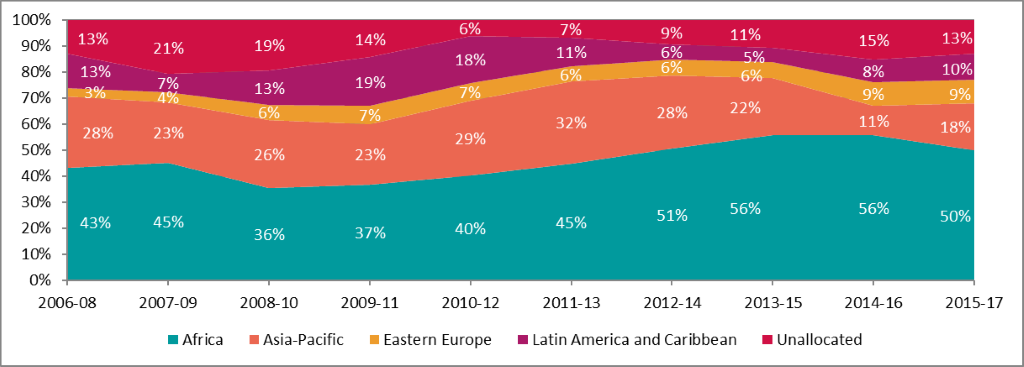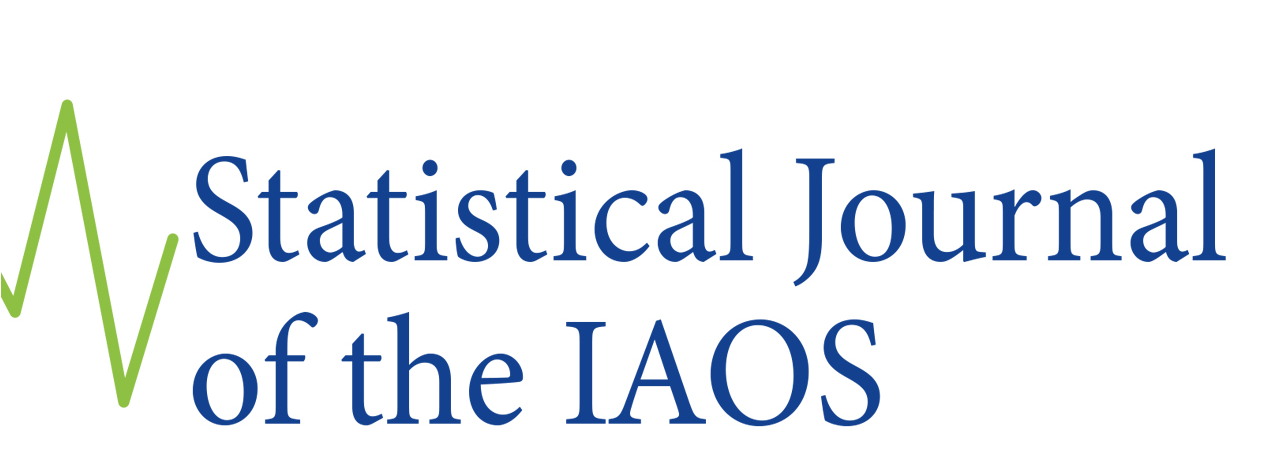
The sixth discussion will focus on the effectiveness of regional cooperation and capacity development on national statistical systems’ strengthening with an emphasis on experiences from the Asia Pacific region.
Overall statement
Improving less developed statistical systems – do we apply the correct foundations and are we at risk of leaving some countries behind?
The UN Secretary General’s Independent Expert Advisory Group (IEAG) speaks of the data revolution as an “explosion” in the volume and production of data matched by a “growing demand for data from all parts of society”. This expansion of the data ecosystem is disruptive to national statistical systems as it requires a radical shift in attention and new capacities to deal with the plethora of new, unstructured data sources and demands from new actors and data users (NGOs, civil society and citizens).
The Partnership in Statistics for Development in the 21st Century (PARIS21) promotes the better use and production of statistics throughout the developing world. PARIS21 is helping national data ecosystems respond to and manage this process through a new approach to capacity known as Capacity Development 4.0 or CD4.01. The objectives of the CD4.0 approach go beyond the traditional production-side interventions to also include the strengthening of data use, literacy and results. The CD4.0 approach is guided by a framework of three levels and five target areas for capacity development. The three levels are individuals, organisations and systems. The five target areas are resources, skills and knowledge, management, politics and power, and incentives.
The CD4.0 is a useful framework for asking ourselves whether international capacity development is focused on lifting the capacity of national statistical systems or whether it is focused on its own needs. Is it supply or demand driven?
On the foundations: Are capacity development efforts more focused on transforming capacity development than transforming national statistical systems?
Discussion starter #1: Statistics capacity development suffers from a foundational problem: Most initiatives aim to produce statistics rather than developing organizational and system capacity.
Many of the capacity development initiatives undertaken are focused on statistical production. Be it filling data gaps for the 2030 Agenda for Sustainable Development, supporting revisions to international statistical standards such as the System of National Accounts, or the 2020 round of Censuses of Population and Housing. Training programs too are focused on statistical production. In contrast, organisational and system capacity development initiatives are less frequent and more difficult to secure investment for or to produce tangible results within funding windows. Changing legislation, for instance, requires time. Is there enough focus on organisational and system issues? How best can we develop organisational and system capacity? Which levels of capacity development (individual, organisational, system) deliver an enduring capacity lift? What is the National Statistical Office’s priority for investment by the capacity development system – individual, organisational or system?
Discussion starter #2: Is capacity development focussing on the new or retaining the old?
The capacity development landscape is a mixture of staff with long career’s in the same institution; consultants contributing during their retirement; and rules and procedures which can favour the tried-and-tested rather than the new. The data revolution and the ever-changing data ecosystem call for a revolution to how we think about and deliver our statistical business. Are retired statisticians the best consultants for supporting countries to adapt to the data revolution and other developmental work? Do capacity development staff from the 1960’s inspire youth with innovation and inspiration or with caution and conservatism? Is there a way to strike a balance between gaining from experts’ knowledge of methodological framework while keeping the approach current and up to date?
On leaving countries behind: does our approach risk leaving countries and regions behind?
Discussion starter #3: Is the global statistical system truly inclusive? Or does it resemble a discussion club for statisticians from developed statistical systems, inviting others to observe from the gallery? Are we leaving some countries behind?
The COVID-19 pandemic has seen a whirlwind of activity: new data sources being used; experimental statistics being produced; and near real-time statistics being released. Developed countries have new drivers for collaboration and cooperation and are embracing the data revolution as the Secretary-General encouraged. Do these new collaboratives, often initiated under the umbrella of the UN Statistical Commission, respond to needs and priorities of the few or the many? Has development assistance to developing countries taken a backseat? Are developing countries able to keep up with the pace of change? Are they able to benefit from global collaboration among statisticians? How do we ensure equal and equitable participation of countries based on level of statistical development or capacity (which very much differ from actual income or economic level/status of countries)?
Discussion starter #4: Is capacity development truly inclusive?
PARIS21’s 2019 Partner Report on Support to Statistics (PRESS) reported between 2016 and 2017, official development assistance to data and statistics rose 11 per cent from USD 623 million to USD 689 million, largely driven by the adoption of the Sustainable Development Goal monitoring framework (Figure 1). Africa received the largest share of statistical support with 50 per cent in 2015-2017 whilst the share of commitments received by the Asia and Pacific region was 18 per cent, a much lower share than the 32 per cent received in 2011-2013. A further 13 per cent was committed to global projects and programmes that were not region-specific. What is driving this disparity in funding for this type of statistical activity? Is this investment mix because of donor priorities to invest in Africa? Are we assuming other regions like Asia and the Pacific now require lesser assistance than what is perceived? What incentives are in place to ensure financial assistance to all developing countries? When do we say assistance is enough? What parameters should we be monitoring apart from the SDG indicators (which again means being more focused on data and statistics production.)

References
Eloi
Eloi OUEDRAOGO
Which levels of capacity development (individual, organizational, system) do deliver an enduring capacity lift?
Any of the level of capacity development (individual, organizational, system) contributes to the delivery of an enduring of the statistical capacity lift. The way the international statistical cooperation has evolved could be linked to the evolving needs of statistical systems of developing countries. After the period of independence of most of African countries, a perfunctory administrative structure resembling the one of the colonizing states was set up. A national statistical system was also set up and sometime it was merely a single national statistical office. This office had as primary role, to produce essential indicators (national accounts, price index, etc.), to collect and disseminate a number of statistics from administrative sources (agriculture, education, health, etc.) and to conduct population censuses, all these being essential for the functioning of at least an embryonal economic planning in these young states. Over time, international development partners made efforts to support the development of the national statistical systems. The first attempts of such support were focused on data production through the important work done by United Nations agencies (UNSD, FAO, UNFPA, ILO, etc.) to help countries to prepare internationally harmonized data production methods, frameworks and standards and to promote their adoption by all countries around the world in order to allow the production of comparable data worldwide. The support of UN agencies was always accompanied with a strong capacity development component with training at individual level for data collection processing and dissemination and at organizational level with the creation or adaptation of the institutional framework required to manage extensive operations such as population or agricultural censuses.
The paradigm of the international cooperation in the field of statistics changed with the advent of global development initiatives such the Millennium Development Goals (SDG), that increased the scope of work required for comprehensive and quality statistics needed to monitor and report these initiatives at national and global levels. This in turn called for a holistic approach to support the development of national statistical systems. The need emerged to raise the profile of developing countries’ national statistical systems to equip them with capacities for, on the one hand, producing relevant, accurate, timely, coherent and accessible statistics and, on the other hand, for strengthening them and making them more organized, coordinated, integrated and comprehensive in terms of the coverage of important sub-sectors. The required capacity development for the later aspect should be focused on organizational and system levels targeting more structured and coordinated systems and more effectively managed statistical organizations and offices.
The holistic approach is already promoted through regional and global initiatives such as the strategic planning and programming in the area of statistics, promoted by Paris21 with the development of the National Strategy for the Development of Statistics (NSDS), the global strategy to improve agricultural and rural statistics (World Bank and FAO). This approach is also supported by all the development partners committed to finance the statistical system development in a coordinated and harmonized manner and guided by agreed common principles on delivering aids along which the principle of country led coordination arrangements.
In conclusion, all the levels of capacity development (individual, organizational, system) deliver an enduring capacity lift. Each country should prioritize its capacity development actions as part of a statistical strategic plan that takes into account all the proven tools available worldwide. This should rely first on domestic funding with, in addition, the support from development partners for implementation.
haleema.saeed
During the last few years, regional cooperation has focused mainly on statistical capacity development by conducting training & workshops related to specific subject-matter domains. In view of the new challenges facing the National Statistical Systems like SDGs, data stewardship, communication and the impact of COVID-19 pandemic and the increased data demands resulting from COVID-19. This requires a reevaluation of the whole strategy to consider all aspects of the regional cooperation between the National Statistical Offices (NSOs) that reflect changing priorities and emerging needs within the National Statistical System (NSS).
With all of these rapid changes surrounding the new world of data that we are facing, the core issue must remain top of our priorities, which is the enhanced regional and global cooperation and making the most of capacity development in Statistics to make sure our programs are inclusive with harder efforts to ensure leaving no one behind.
Support can be provided through regional level capacity development activities in the following areas:
1. Unifying & harmonizing of statistical indicators, definitions & terminologies for comparison.
2. Preparing standardized methodologies for data collection & analysis to the development of statistical work.
3. Sharing of best practices & experiences between the countries.
4. Synergizing of joint project at the regional level. MEDSTAT program is a success story, which aims to enhance the international statistical cooperation activities of the European Union (EU) with non-member countries and focuses on cooperation with Mediterranean countries in the context of the European Neighborhood Policy (ENP), in other words the ENP-South countries. Other organizations provide capacity development to this region like PARIS21.
5. Harmonizing of regional statistical bodies, but unfortunately it's, in some cases, not active while in other cases, they are competitive which results from lack of coordination to have an effective and efficient intervention. There must be a clear and effective mechanism for coordination between the different statistical bodies.
6. Lacking of both financial & technical resources: Regional Statistical Offices still face a challenge in financial & technical resources, where the NSOs lack experiences in new statistical fields such as: big data, data science, data revolution and artificial intelligence.
7. Developing of a regional statistical database/platform to unify the efforts of data requests from several regional and international agencies.
JamesWhitworth
There are a lot of questions, here. I look forward to seeing some answers from contributors.
As a recently retired statistician, may I offer a (hopefully) unbiased opinion on #2? There is no doubt that retirees have an enormous pool of knowledge and in my experience the implication that they may be stuck in the past might be a little unfair. However in general they will usually have an alternative income source, so may be able to work more cheaply than those who rely solely on consultancy fees; which of course will distort the market. Also they sometimes have the luxury to be able to “cherry pick” assignments that suit them and reject the ones that might be of higher priority. So, yes, wise old men and women have a lot to offer, but a better balance is needed.
Concerning inclusiveness of capacity development (#4), it was certainly my experience, moreso towards the end of my career, that there was indeed a tendency to privilege certain regions of the world. Co-ordination of donors’ policies has been a holy grail, but is a long way from being achieved.
Finally, it is clear that even if and when we are back to “normal” after the current crisis, we will not be working in the same way as before. Owing to the distances involved in the ESCAP region, you are more advanced in virtual meetings and remote learning than most of the rest of the world.
